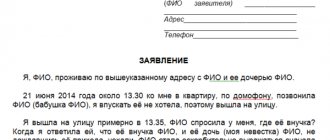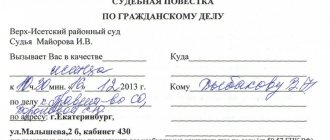In this article you will find instructions on how to correctly write a statement of claim for insult to honor and dignity of a person and where to file it, given that this is not a criminal offense and the police cannot deal with this issue. Read more about the article of the law of the Russian Federation on insulting a person (what can be considered an insult, what punishment is provided for this, what is the procedure for protecting citizens from insults that is currently in effect) here.
Personal insult. Where to contact?
How to punish a person for insulting? To do this, it is necessary to understand what the legal phenomenon of “insult” is and what is included in its definition.
According to Article 130 of the Criminal Code, which for a long time was the legislator in determining responsibility, punishment, and also gave characteristics of the act, an insult includes an indecent action towards the victim.
That is, the perpetrator may verbally express, in the presence of third parties, an obscene phrase addressed to the victim, or otherwise behave indecently.
On this basis, a citizen has the opportunity to seek legal protection:
- to the police station;
- to the prosecutor's office;
- to court.
The choice of authority depends on:
- What are the relationships between the conflicting persons?
- At what stage is the trial process at a certain moment?
- What evidence of guilt does the victim have?
Where is it served?
After the application has been drawn up and the documents have been prepared, you should go to court. The appeal is made to an arbitration or court of general jurisdiction. Documents are transmitted through the court office, by mail or electronic services.
The law provides for a pre-trial settlement procedure. To do this, you must file a claim against the person who violated the right. There are general requirements for filing a claim. The transfer of the document is carried out using a method confirming the fact of delivery, for example, mail with a return receipt. We recommend that you additionally make a list of the attachment to confirm the sending of the document you are referring to.
How to prove?
In order to prove an insult , previously (until 2012) two witnesses were needed in whose presence it was uttered. Currently, this procedure has become simplified, since the issue is considered primarily administratively in accordance with Art. 5.61 of the Administrative Code, which does not have legal consequences in the form of a criminal record, which remains practically throughout the citizen’s entire life.
Nowadays, to convict the culprit . In addition to witness testimony, video or audio recordings, photographs and other possible materials can be used as evidence of guilt. Of course, you may not predict at what moment you will be insulted and, most likely, you will not have time to turn on the recorder. However, many citizens turn it on almost always when the conversation gets louder. This habit will always allow you to protect your rights, as well as punish the offender according to his deserts.
If you didn’t have time to do this, ask those around you if anyone managed to film or record this person’s words. Also, do not hesitate to reach out to others and ask for their addresses so that they can testify in your favor. If the incident took place in a public place, ask where the video cameras are and whether your conflict was in their field of view.
It is no more difficult to prove the guilt of a person who systematically allows offensive remarks and statements addressed to you in a domestic environment.
Such relationships are often found on the part of neighbors. How to correctly file a statement of insulting a neighbor to the police (militia)? You need to work with them very carefully, the process of communication between you needs to be completely under control.
The evidence base must be obtained as follows:
- Turn on the recorder (discreetly) when he starts negative dialogue.
- If he insulted you, and you did not have time to record it, you can: turn on the recorder (unnoticed), start a conversation about what he said to you last time (repeat) the phrase for which you demand an apology from him. His reaction to this, if he refuses to apologize and continues to make obscene statements, will be proof.
- Invite friends over and have this conversation so they can testify.
- Ask other victims he abuses to band together and testify in each other's defense.
You can find many similar options and actively use them.
What is the difference between statements of insult to honor and dignity and insult to personality?
Before filing a complaint about insult and threats, it is necessary to clarify one important point. Until 2012, the current Article 130 of the Criminal Code of the Russian Federation provided for the wording “insulting a person .
Modern legislation provides for the wording “insult to honor and dignity” in accordance with the administrative liability charged. It logically follows that the relevance of the statement will be determined by the insult to honor and dignity. There are no differences in the fact of the act, since honor and dignity are the property of the individual citizen.
Contents of the appeal
In order to correctly write an appeal to the prosecutor’s office under Art. 5.61 of the Code of Administrative Offenses of the Russian Federation, you need to analyze what evidence and what facts you can provide, and also whether this data is sufficient to bring the offender to justice.
So, recommendations for compilation:
- Please provide your details correctly – full name, place of residence, phone number, age. This is necessary so that, if necessary, the assistant prosecutor appointed as the responsible executor for your material will contact you. In addition, the prosecutor's office has an Instruction on the procedure for receiving complaints, according to which, if there is no return address in a written appeal, the prosecutor may not verify the facts stated in it.
- Do not limit yourself to mentioning only the fact of the insult: the more detailed the events are described, the faster a decision will be made.
- All relevant evidence must be attached to the documents: they can be audio recordings, explanations of eyewitnesses, data from outdoor video surveillance cameras, letters of offensive content, etc. If you know the personal information of the person who insulted you, be sure to report this in the application, since the prosecutor may instruct the local police officer to interview him, as well as other citizens, on the circumstances you specified.
- Let us remind you that you can submit your appeal online to the prosecutor’s office of the region where you live. The requirements for formatting an email are the same as for a regular letter.
- State your reasons clearly. If the text is considered meaningless and incomprehensible, the prosecutor has the right to return the message back to the addressee without consideration.
- Correctly indicate the address of the place where the insult was committed - the prosecutor will check whether the territorial responsibility of this prosecutor’s office to consider your appeal. If it turns out that the incident occurred in another area, everything will be sent to the appropriate prosecutor's office.
Types of personal insult claims
A counter-statement for personal insult provides for a situation in which indecent actions were committed against you, which resulted in a similar reaction on your part or vice versa.
At the same time, the participant in the conflict filed a statement against you . You have the right to file a counter-application against the applicant. It is submitted upon your notification of the submitted application.
You will be required to indicate what happened more objectively.
A statement to the police (militia) for insult is filed based on the fact of direct illegal and indecent behavior addressed to you. That is, no later than 10 days after the insulting incident.
The local or regional police department will tell you how to correctly write a statement to the police You can contact the department almost immediately, the duty officer or local police officer will receive you and, from your words, write down everything that you state and that is relevant to the case. All you have to do is sign it.
In order to file it, you need to go to the area where the perpetrator lives and tell the person on duty that you have been insulted and you intend to file a complaint. You need to have your passport and information about the identity of the attacker with you. If you were insulted by an unknown person, naturally they will not put him on the wanted list. If you have an approximate idea of the culprit, proceed from the information that you have and use it.
Is it possible to sue a person for insult? Citizens are not allowed to directly file a lawsuit without evidence. If you have irrefutable evidence, you can do this, but only after a pre-trial investigation has been conducted and the police refuse to file documents with the court.
A claim for personal insult is filed at the place of residence of the defendant, that is, the person who insulted you, in the district court.
That is, to file a claim for insult to honor and dignity, you must have information about the defendant and his identity must be established.
It must be drawn up in a certain form, with reference to legislative documents, which requires contacting an experienced specialist. Some victims do it simpler - copy the statement of claim from the site and paste their data into it.
a statement of claim in court for insult to personality.
But such actions may not be effective if you do not explain the fact of the insult as it happened in your particular case. Typically, the filing of such applications is accompanied by a claim for compensation for moral and possibly material damage.
Compensation may be charged if, due to the actions of the offending person, the victim was unable to:
- close the deal;
- to go to work;
- carry out other actions.
Damage from the fact that he fell out of communications is an opportunity to recover lost profits or compensate for losses. And if the plaintiff suffered, he can recover moral damages. In this case, the amount of the claim must be indicated in the application immediately.
If financial issues do not play a primary role, you can submit a statement of defamation to your local inspector. To do this, you need to go to the district police station and ask to invite your local police officer.
He will accept your application and even help you draft it. It can be written on a standard form of the police department (militia) , or it can be compiled in a simple form. It will need to indicate all the information about the event that occurred and the consequences that occurred against the background of the insult.
The application submitted to him will be put into production, and he will independently collect the necessary documents and evidence. And then he will initiate a criminal case in court through the investigative department of the police (militia).
If the offender does not live in your area, you need to contact the local police officer at his place of residence. Contacting a local police officer can be effective for preventive purposes when you need the issue to be under control and supervised from the outside.
An application to the prosecutor's office is usually submitted if you have been insulted by an official. In this case, you need to go to the district prosecutor's office at the place of residence of the culprit or at his place of work. To do this, you also need to have information about the culprit that needs to be indicated. This statement is written in free form, indicating all the necessary information. It further states the facts that explain the existence of the insult.
Download a sample application to the prosecutor's office for personal insult.
Based on this statement, a prosecutor's investigation will be ordered, and indecent behavior in the form of insult will be punished with a serious fine.
Your statement of insult will go to the prosecutor's office in any case, even if it was initially submitted to the police station, if we are talking about the administrative responsibility of the insulter.
Legal signs of insult.
A mandatory sign of insult, as mentioned above, is an indecent form of humiliation of the honor and dignity of a person, when an indecent statement, a curse, a humiliating nickname, etc. is addressed to a person orally or in writing.
An insult is always directed at a specific person. A humiliating assessment of a person can be given both in the presence of the insulted person and in his absence, when the insulter characterizes the absent person in an indecent, humiliating form, knowing that he will subsequently become aware of this.
It is important to distinguish insult from simple rudeness. These concepts are relatively close, since one may include the other, but there are still differences.
Rudeness is rude, arrogant, impudent behavior that offends or humiliates someone. It can be either a method of conducting a discussion or a normal, everyday manner of communication. Often they are used to cover up various complexes, insufficient level of erudition, lack of arguments, etc. Thus, the purpose of rudeness is not always just a conscious desire to offend, shock or disarm an interlocutor, to silence an opponent, to suppress him, to show his superiority, to provoke retaliatory actions, or to win a dispute in any way. Often the purpose of rudeness is the desire to attract attention to oneself, to hide one’s shortcomings. Another characteristic feature of rudeness is that it can be unaddressed - extending not to a specific person, but to an entire group.
Insult is another matter. This is a deliberate statement addressed to a specific person, always pursuing one goal - to humiliate him.
If an essentially offensive statement is not addressed to anyone in particular, but can be perceived by everyone personally, then in real life it is most likely hooliganism (deliberate actions that grossly violate public order and express clear disrespect for society).
From a legal point of view, it is impossible to offend an organization (but certain statements can harm its business reputation, which is also fraught with consequences), a product, weather conditions, a work of art, etc. However, in connection with the mention of a specific person, there may also be signs of indirect insult.
Very often, insults are caused by users of forums on the Internet. The main feature of Internet communication is anonymity, that is, communication between virtual interlocutors who hide all information about themselves under nicknames. An insult inflicted on such forums in conditions of anonymity - by one nickname to another nickname without providing his real data or other information that clearly allows him to be associated with a specific person - as a rule, cannot be regarded as punishable by law. This can be explained simply - under such conditions it is quite difficult to prove that the offender had intent to insult a specific (real) person, i.e. to inflict moral harm on him in the form of humiliation of his human dignity.
It’s another matter if the insult is inflicted by the user by presenting on the forums in any form (for example, in text or by posting a photograph) real (including personal) data of the insulted user, other information that clearly allows him to be associated with a specific person, or is expressed against a third party (who is not a user). Such actions (at the request of the offended person, who has applied to the authorized state bodies, or on the initiative of these bodies), under certain conditions, may already entail the application of more stringent measures to the offended person, as provided for by law.
Taking into account that posting information on the Internet is recognized as a method of public dissemination, it should also be noted that the law specifically stipulates liability for insult caused in a public speech, or in a printed or publicly displayed work.
Insult should also be distinguished from slander. The differences lie in the fact that false information, facts or fabrications are presented through slander, while for liability for insult it does not matter whether the offensive words correspond to reality.
Now you know that for any offensive action you can punish the offender. Now let’s look at where to go to protect your violated rights.
What to do if a claim has been filed against you?
If you have been informed that a complaint has been filed against you for threatening and insulting, you must proceed from the circumstances of the case that led to the insult. The outcome depends on the degree of your guilt and the guilt of the applicant.
You will have the following options:
Collect evidence of the applicant’s guilt and file a counterclaim.- Repent and do not argue and pay the fine that will be charged to you.
- Reconcile with the applicant and close the case after reconciliation of the parties.
If a complaint of insult has been filed against you , the best option would be to reconcile with the other party, which will close the case and it will not be referred to the administrative commission or court.
This can be done in two ways:
- Explain to the applicant that you will take certain measures and prove his guilt, since both took part in the conflict. After this, offer to reconcile.
- Apologize for your behavior to the victim, offer small moral compensation and reconcile with him.
Please note that the official to whom the application was submitted will assist you in this process. By informing him of your intentions, you can reconcile through his mediation.
Any conflict is destructive in nature . Such relationships can be corrected through reconciliation, even if the parties have descended into one-sided or mutual insults.
You always need to understand that only the same can be produced from conflict and grievances. But if you think that retribution from the perpetrator is necessary for the offense inflicted on you, act with confidence.








